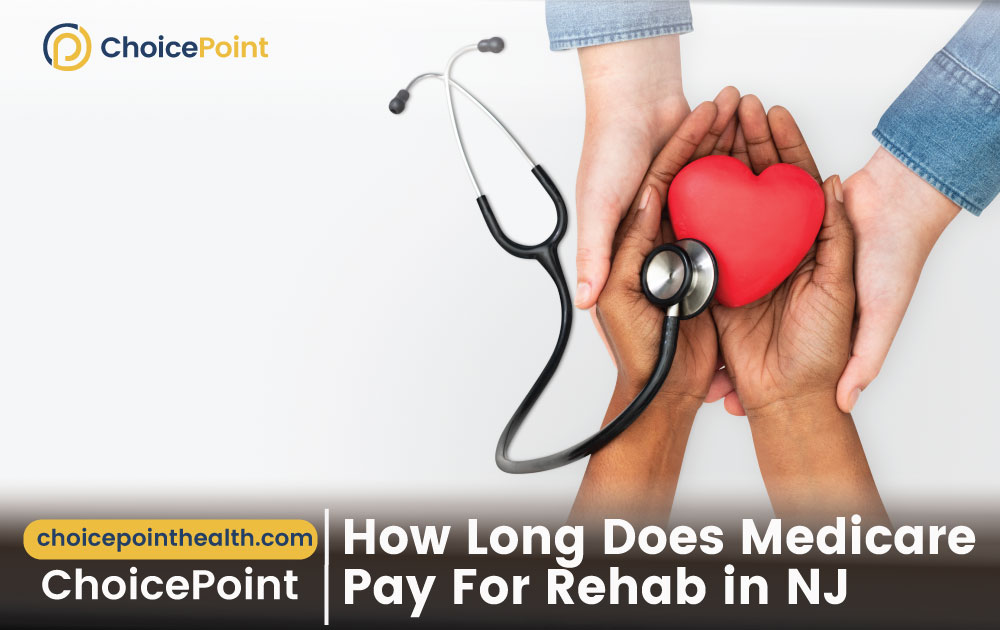The average expenditure of Medicare per enrollee in New Jersey is $12,789. However, prolonged rehab can increase spending, and a person might opt out of Medicare coverage due to its limited time of provision. In this case, rehab treatment can be burdensome and sometimes impossible. ChoicePoint offers hassle-free addiction treatment, so you don’t need to worry about how long does Medicare pay for rehab in NJ as we have numerous commercial insurance programs to assist you. Call Now 844.445.2563 to know more!
Table of Contents
How Long Does Medicare Pay For Rehab in NJ
Medicare begins with a benefit period. A benefit period is when a person has been admitted first time for treatment at rehab after starting Medicare insurance. It ends when an individual has been discharged from the rehab center and hasn’t been admitted again in the next consecutive 60 days.
Original Medicare usually works on three timelines with two parts of plans, including hospital and medical care coverage.
Below are the details of how many days Medicare pay for rehab:
a. 60 Days of Deductible Medicare
From admission to the 60th day, a person can get 100% support from the Medicare Part A plan, which covers all their treatment costs once they have paid their deductibles.
b. 30 Days of Coinsurance Medicare
After an individual has passed 60 days in rehab under Medicare, on the 61st day, they will have to pay $400 as a copayment each day until the 90th day of treatment. Medicare will assist with the remaining treatment cost in part B.
c. 60 Days of Lifetime Reserve Medicare
Original Medicare works only for a maximum period of 90 days. From the 91st day, an individual can avail of one’s additional lifetime reserve days of treatment coverage plan that also requires them to pay $800 as a copayment for each day till 60-day completion. This period of treatment can be availed only once in a lifetime.
What to Do if Medicare Stops Paying For Rehab in NJ
Rehab treatment can be burdensome if someone or their loved one runs out of Medicare. There are some helpful tips to escape the trouble of impeding treatment.
- Find other payment sources, such as private insurance, crowdfunding, Medicaid, etc.
- Try to determine the length of possible stay at the rehab beforehand. To get an idea of costs.
- Consider applying for a legal appeal at insurance because one has the right to. This may help them to retain care for an extended period.
- Always keep a plan B in mind before starting treatment. A person will never know when their treatment ends as it’s a healthcare process,
- Stay close to the person getting treatment. It will greatly help them, even if they have no finances to get treatment.
Did your insurance stop paying or get canceled? Don’t worry. We’ve got you covered! Call Now 844.445.2563 to get treatment through your other means!
Addiction Treatment Programs That Medicare Pays For
Medicare does pay for rehab, especially for alcohol and substance use disorders, in the following procedures:
- Alcohol/Drug Testing
- Mental health screening
- Substance use counseling, i.e., educating and raising awareness among people of the harmful effects of addiction
- FDA-Approved Medication-Assisted Treatment
- Outpatient followups and scheduling
- Telehealth addiction treatment programs
- Psychotherapy, i.e., CBT, DBT, individual, group, and family therapies.
Moreover, Structured Assessment and Brief Intervention (SBIRT) is also covered under Medicare that is processed in outpatient settings and involves:
- Screening
- Initial intervention
- Referral to treatment
This procedure benefits those who have just started showing substance use disorder symptoms or alcohol dependency and are fairly diagnosed for beforehand treatment. All of these procedures are followed in Medicare plans. Initially, Medicare consisted of Part A and Part B, the Original Medicare plan. Part C and D are additional coverage plans to combine and assist original Medicare in covering treatment comprehensively.
Medicare Part A
Generally considered hospital insurance. This part covers all inpatient treatment services as mentioned above. However, remember how long does Medicare Pay for rehab only covers a lifetime of 190 days of treatment, so make sure to arrange treatment costs and plan accordingly.
Medicare Part B
covers all the costs of outpatient services, intensive outpatient for mental disorders, and telehealth services for rehab. It is originally a part of the original Medicare plan and is known as medical insurance. It also mainly covers opioid use disorder treatment and its medication at both setups.
Medicare Part C
Often referred to as Medicare Advantage Plan, it is provided by private companies and approved by Medicare. It may consist of Medicare Plan A, B, D, and other benefits not covered by individual parts.
Medicare Part D
is often termed a medically managed Medicare plan that covers outpatient treatment costs and FDA-approved drug rehab medications such as Suboxone, Subutex, Naltrexone, and Buprenorphine. It also covers prescription drugs required for addiction treatment to cover minor symptoms. You need to buy it separately or combined with the Medicare Advantage plan.
Find out about your Medicare plan. Call Now 844.445.2563 to confirm your treatment options with ChoicePoint!
The Solution to Prolonged Rehab Without Medicare in NJ
Don’t worry about How long does Medicare pay for rehab in NJ because ChoicePoint has all you need. We offer comprehensive addiction treatment plans with or without insurance with the best possible care!
Fill out this form to schedule a call and discuss your financing options for the treatment. You can call Now 844.445.2563 to get our 24/7 virtual assistant service on rehab in NJ!
Medical Disclaimer:
ChoicePoint aims to improve the quality of life for people struggling with substance use disorder and mental health issues. Our team of licensed medical professionals research, edit and review the content before publishing. However, this information is not intended to be a substitute for professional medical advice, diagnosis, or treatment. For medical advice please consult your physicians or ChoicePoint's qualified staff.









